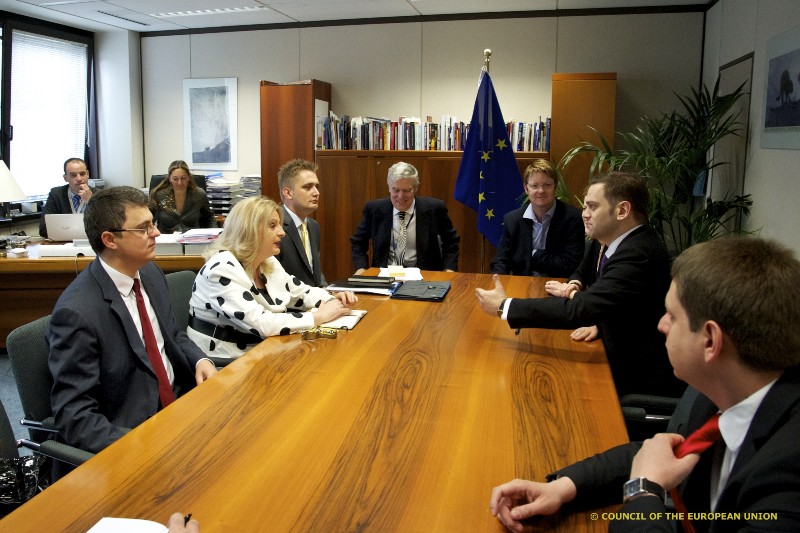Cadastral Records
Kosovo and Serbia reached the Agreement on Cadastral Records on 2 September 2011. The arrangement aimed at establishing a reliable cadaster in Kosovo; which was a prerequisite for the protection of people’s legitimate claims to the property.
This issue became part of the dialogue because after 1999, with the rapid return of Kosovo Albanians and the need for alternative accommodation for those who have lost their property, as well as the displacement of large numbers of the Serbian population, there was an increase on the cases of violation of tenure and occupancy rights. Kosovo’s cadastral records were destroyed, lost, or relocated in Serbia. These records covered the periods from 1983 to 1999 and resulted in around 60,000 unresolved property disputes.
In such circumstances, UNMIK, with assistance from international donors, had started the process of re-establishing the cadastral information system in Kosovo. Yet, many gaps had still remained.
In line with the agreement, the process of establishing a reliable record would go through the following steps:
- European Union Office in Kosovo will receive scanned copies of all original pre-1999 cadastral records;
- А technical agency will compare all copies of the original pre-1999 private property cadastral records with the reconstructed Kosovo cadaster;
- A tripartite implementation group (one cadastral expert from Kosovo, one from Serbia and the chair from the European Union) will monitor the work of this agency;
- The conflictual cases are transferred (by the implementation group) to an adjudication mechanism to make the final decision;
- The first instance of this mechanism will be a Commission consisting of international and cadastral and property experts (from Kosovo), the majority of which are appointed by the EUSR (taking into account the interests of all communities concerned).
- Kosovo Supreme Court will serve as the final instance, and the decisions are taken by a panel in which international judges hold the majority.
The implementation was supposed to start in 2012, but it was hindered by two issues:
- Kosovo’s delay to promulgate the law on the establishment of the technical agency (new Kosovo Property Comparison and Verification Agency);
- And the verdict of the Constitutional Court of Serbia; which deemed the agreement unconstitutional.
After some years, on 9 June 2016, Kosovo finally adopted the Law on the establishment of the Technical Agency (KPCVA).
The Kosovo law on KPCVA, foresaw:
- The Technical Agency Board, consisting of five (5) members, two of which, appointed by the Kosovo Assembly as proposed by the Prime Minister, while the other three, appointed by the European Union Special Representative (EUSR).
- The Executive Secretariat, consisting of one Director and Deputy Director, appointed by the Kosovo Assembly on proposals by the Prime Minister.
- The First instance of the adjudication mechanism or the Property Verification and Adjudication Commission (PVAC) consisting of five (5) members. Two members of PVAC, appointed by the Assembly of the Republic of Kosovo upon the nomination of the President of the Supreme Court of the Republic of Kosovo, while three other members, including one representative of non-majority communities, appointed by the EUSR.
- The Second instance of adjudication mechanism, the Supreme Court, which decides on appeals in a panel of three judges; with two members appointed pursuant to the provisions of the Kosovo Assembly on proposals by the Prime Minister and one member appointed on the proposal of the Kosovo Judicial Council and approval by the President of the Republic of Kosovo.
As for Serbia, a government decree was adopted to enable the implementation.
However, these efforts were not enough. The agreement is listed among the unimplemented ones and to this day, continues to generate everyday problems for the citizens.
As for the reasons why the agreement has not been implemented, the following are mainly pointed out:
- The returned cadastral records would challenge many decisions taken after 1999, as a result of which a lot of public properties were occupied or transferred;
- Serbia could not accept the establishment of the technical agency through the law and feared that decisions on the verification of property would be made without the involvement of Kosovo Serb representatives (and would not be able to protect their property claims and those of the Serbian Orthodox Church).


